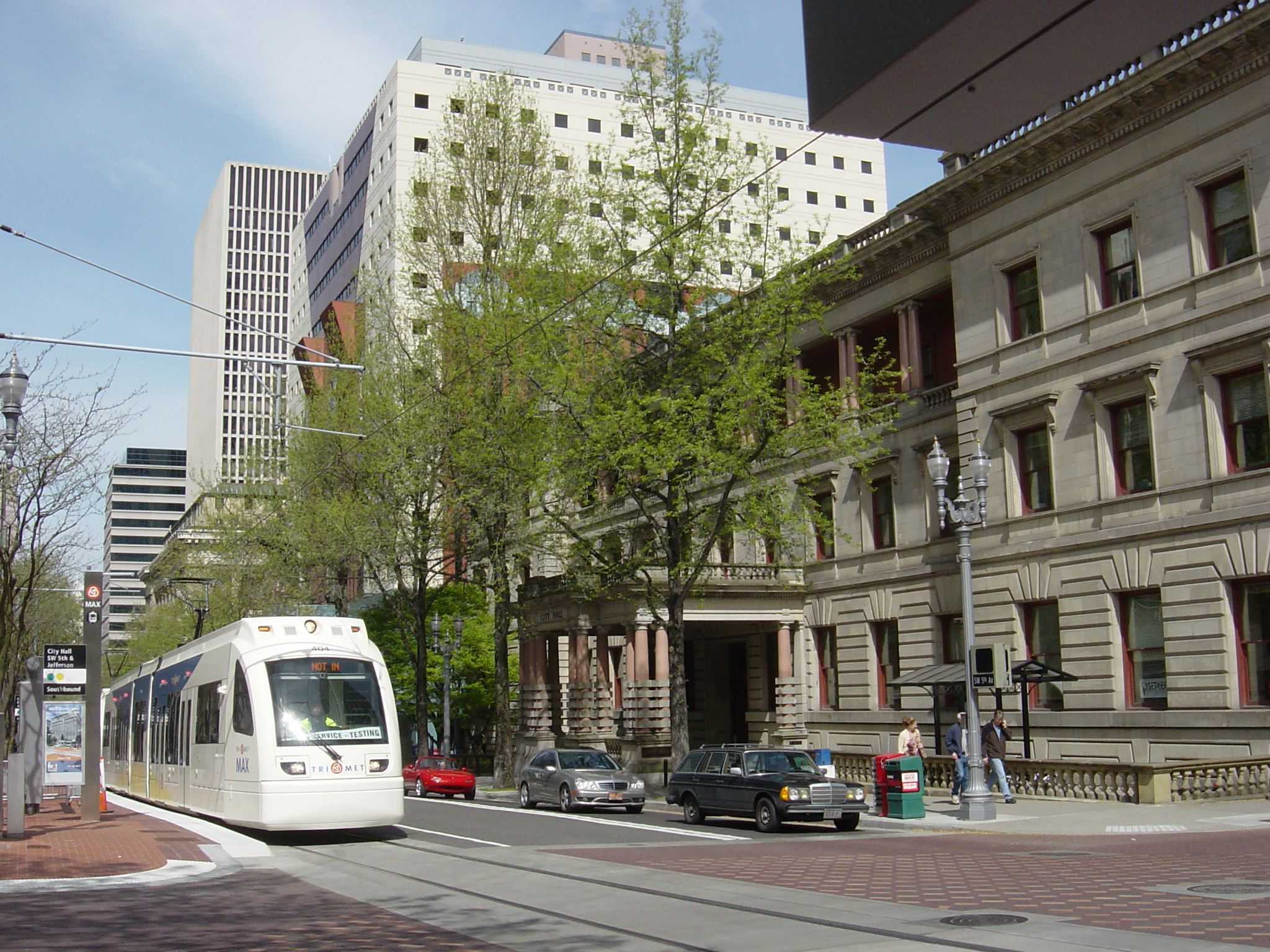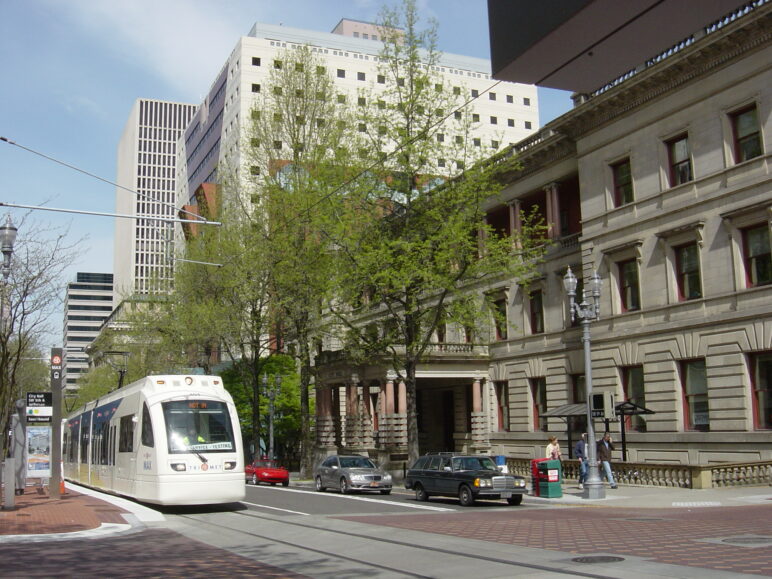It’s been just over a year since Portland voters approved Ballot Measure 26-228 to completely revise the city charter. And we’re now less than a year away from the first time residents will exercise the city’s new proportional ranked choice voting (RCV) system to elect their new government. What do Portland voters and democracy reformers around the country need to know about the ongoing construction of this pioneering model?
In brief, the city’s transition is on track, and Portland’s transition team and leadership have (mostly) been looking for the most effective pathways to implement the will of the voters. With the help of independent commissions and many partnerships, the city has crafted new districts, revised election rules, planned for voter education, and designed a new organizational structure. Candidates are already lining up to represent their communities.
While the city’s transition team still has more to build, Portland’s progress so far demonstrates that intentional processes and continuous community involvement can create a solid foundation for a representative and effective government.
Background: An opportunity for change but no guarantee
Every ten years, the city of Portland reexamines its charter, the document that lays out how city leadership is structured and how it gets elected. The city council appoints a Charter Commission composed of volunteers from across the city to research and recommend changes to city voters.
Many Portlanders have long been interested in change (and indeed advocated to institute regular charter review, which began in 2010), knowing that city council is not representative of residents’ diverse interests and that the current form of government impedes effective governance across the city, from trash to parking. Advocates for change paid close attention to opportunities for involvement in the Charter Commission, and many commission members (whom the city selected from a record-breaking pool of almost 300 applicants) hoped to use the process to forge a more representative government.
In 2022, after more than a year of research and hundreds of hours of public comments, the commission recommended a suite of reforms (many of which Sightline previewed in 2017), including allowing voters to rank candidates, creating four new districts that will each elect three council members (aka proportional multi-winner districts), and replacing the commission form of government with a city council that sets policy and a city administrator who, along with the mayor, runs the city’s day-to-day operations. These changes, collected into Ballot Measure 26-228, passed in November 2022 with 58 percent of the vote.
Big changes in government structure move forward
City staff started planning implementation of the reforms almost immediately after the measure passed and published an annual report in November 2023 of progress thus far. A city transition team is managing the project, and a Government Transition Advisory Committee (GTAC) comprising community members advises the overall process. The city created a webpage and newsletter that tracks the transition and, in July 2023, published a full work plan that includes specific opportunities for public input and feedback.
To guard against potential bias within controversial elements of the revisioning process, the charter amendments directed the city to appoint an Independent District Commission to draw the four new geographic districts and an Independent Salary Commission to establish salaries for the new officeholders. Both commissions prioritized input and representation from historically underrepresented groups, including communities of color and East Portland residents.
This past July, the Salary Commission finalized the new councilors’ salaries, based on the thriving wage calculator from MIT and market data so that leaders will be fairly compensated for their service. Then in August, the District Commission adopted a new district map that reflects numerous rounds of community feedback, and in September it published a full background of its process, considerations, and public commentary. The district voting calendar also prioritizes participation from underrepresented groups; elections for the two districts with historically lower voter turnout rates will be held in presidential election years, which typically garner higher levels of turnout. And in November, city council approved a new government organizational chart.
Electoral upgrades are on track
The city has also prepared the scaffolding for the upcoming electoral changes. Under the new system, voters across the city will elect Portland’s mayor and city auditor using single-winner RCV, and each of the four new districts will elect three councilors using proportional multi-winner RCV (also known as single transferrable vote). Multnomah County also approved the use of single-winner RCV for all elected county offices, which will take effect in 2026.
So far, Portland has followed many of the best practices the national RCV Resource Center recommends and has been communicating regularly with other experts in electoral reform. In addition to finalizing geographic electoral districts, the transition team’s actions in the past year related to elections include:
- Updating the election code with specifics for implementing RCV. The city convened a workgroup comprising city offices, Multnomah County Elections Division, and the RCV Resource Center to draft election code, which then moved through a public input process similar to that for the other new rules, with hearings, presentations, and public comment periods. In April 2023, city council adopted the election code, which specifies that voters can rank up to six candidates for each contest, eliminates the primary, and describes how skipped rankings and overvotes (when a voter gives multiple candidates in a contest the same rank) will be tabulated.
- Coordinating election administration across jurisdictions. Since fewer than 2,000 of Portland’s 460,000 registered voters live outside Multnomah County, Clackamas and Washington Counties agreed that Multnomah County will design ballots and count votes for Portland’s ranked choice contests. Multnomah County Elections Division is collaborating with Portland’s transition team to set up processes for the new election format and is learning lessons from the RCV Resource Center as well as other jurisdictions that have implemented single- and multi-winner RCV in other states.
- Moving toward certification. At request of Multnomah County, voting system vendor Clear Ballot initiated the federal certification and laboratory review processes (which the state of Oregon requires) for the RCV system in September 2023 and anticipates certification in early summer 2024. This authorization will also pave the way for the numerous other jurisdictions across the region that use Clear Ballot to easily implement RCV.
- Planning for voter outreach and education. The transition team developed a three-pronged approach to voter education: using existing channels like government websites and voter guides, candidate education, and partnerships for hard-to-reach voters. The city awarded a voter education contract to Portland’s United Way of the Columbia-Willamette to work with Hearts & Minds Communications, Portland United for Change, and Democracy Rising—a powerful combination of local community expertise and national RCV communication specialists—to engage directly with voters. Voter education kicked off in October 2023 and will ramp up next year.
Attempts to upend the process have continued
The transition process has hit some political obstructions. In July 2023, Commissioners Rene Gonzalez and Dan Ryan floated a proposal to limit some of the elements of the transition plan, including removing the use of proportional RCV (a counter that had been in the works for some time), but advocates of the voter-approved charter change united to oppose impairments to the original, carefully considered measure, and the alternative proposal did not move forward.
More recently, the city transition team drafted a plan to move city administration from the current commissioner-managed bureaus to an interim city administrator in July 2024, providing a six-month period before the new council takes office in January 2025. While current commissioners rejected the initial proposed plan, Mayor Ted Wheeler supported the proposal as a way to ensure a smooth transition and is still considering using his authority to take back management of the bureaus in July. Commissioners also instigated a measure to hold more authority over decisions made throughout the transition, which they argued was necessary for them to see through their terms as elected representatives. Wheeler, however, noted that the increased line of authority may slow the process.
These squabbles may slightly disrupt the transition, but hopefully will not swell enough to detract significantly from the planned shift.
What we’re watching over the next year
While Sightline Institute is following the city’s entire transition process, we’re inspecting the electoral reforms most closely. The upcoming voter education effort in particular will be hugely important to the overall success of the charter reform and whether it delivers improvements to Portland’s elections and governance. The city seems to be headed in the right direction, with staff taking the charge seriously and partnerships with both national groups that have contributed effectively elsewhere and local leaders who best know how to engage their communities. The statewide primary in May 2024, which will not use RCV because no Portland offices are on the ballot, slightly complicates efforts to get the word out early: advocates don’t want to roll out instructions for a new kind of ballot to city voters too soon.
We’ll also be looking for the city’s plans for reporting electoral results. According to the RCV Resource Center, transparently sharing results round by round is the best way to keep voters’ trust in the electoral process. Portlanders should also be alerted that full results won’t be available the night of the ballot return deadline, since so many ballots come in on the last day (this delay is sometimes blamed on RCV, although it’s already a facet of most elections).
Finally, we’ll be watching how Portland’s transition plans interact with Oregon’s statewide ballot measure to adopt RCV. Next November, voters in Portland will use RCV for the first time and decide if they want RCV statewide, so any education efforts aimed at either will hopefully cover both topics.
When they cast their ballots in 2022, Portlanders voted for a more representative and effective government. And despite a few wrinkles, Portland’s transition team has had a productive year working to execute that goal. As the changes progress, we’re hopeful that Portland can continue to be a regional and even national leader in upgrading our democratic systems.










Terry Harris
In your “what we’re watching” section, I see nothing about the city’s budget as it relates to the charter reforms. Already, the small donor elections program is facing massive cuts, and the proposed budget for the new city council will kneecap the council’s capabilities before new councilors are even sworn in. Meanwhile, a new top-heavy bureaucracy redesigns itself without much in the way of meaningful oversight.
I understand Sightline has been in the tank for these reforms for quite some time now, but the charter election is over.The cheerleading is no longer necessary. Charter reformers really need to pay closer attention.
Jane Bacchieri
Ditto Mr. Harris’ comments. Transforming ballot concept into a city government that works at both the legislative and operational levels is complicated and largely not understood by the voters who approved the ballot measure as well as the author of this article. The current City Council is making decisions about the structure and function of the future city government for which they will have no accountability. Unfortunately, communications around the transition work has been wholly inadequate. The average Portlander, including those who supported the ballot measure, know little if anything about the status of this work, how incredibly expensive it is going to be, the impacts it will have on city operations and services, and how unprepared the city bureaucracy is for these changes.